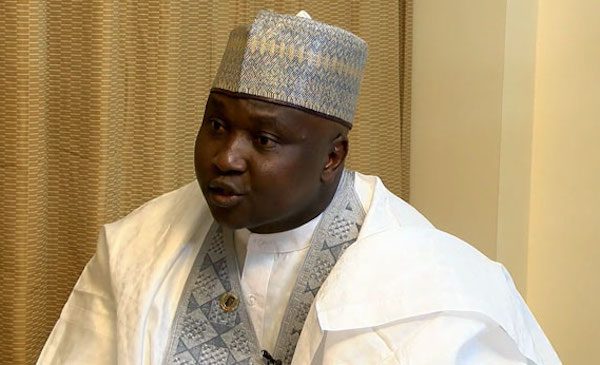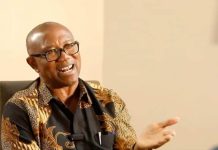A Federal High Court in Kano ruled on Monday that Alhassan Ado Doguwa, the majority leader of the House of Representatives, was not the target of criminal conspiracy charges for culpable homicide.
Justice Mohammad Yunusa, the court’s presiding judge, further declared that he had the authority to hear the ex parte application for bail of Alhassan Ado Doguwa, the embattled majority leader of the House of Representatives, and to grant it in the amount of N500 million.
In ruling on Doguwa’s motion on notice challenging his fundamental rights and the lower court’s unlawful detention, Justice Yunusa declared that the Chief Magistrate Court lacked the authority to hear any case involving a potential criminal conspiracy.
Justice Yunusa cited Section 251 (1) as well, which gave the Federal court exclusive jurisdiction to hear cases involving firearms, such as those in the charges brought against Doguwa. Doguwa was granted bail, but the judge made it clear that this was not to shield him from going to trial. Justice Yunusa insisted that the law must be followed.
In affidavits filed with the court, Doguwa requested that his fundamental rights, as protected by the constitution and other legal charters, be upheld. Doguwa’s attorney was Nureini Jimoh, SAN.
According to the senior attorney, Doguwa was unlawfully detained by the police and violated his right to liberty and freedom in violation of several provisions of the 1999 constitution as amended. According to the affidavits, the applicant’s attorney had argued that the Chief Magistrate’s imprisonment of his client was illegal and unconstitutional because lower courts lack the authority to try criminal cases.
Dissatisfied with the court’s decision to release Doguwa, the prosecution’s attorney, AB Saleh, questioned the Federal High Court’s authority to carry out the rulings, insisting that Justice Yunusa’s actions amounted to a gross abuse of the legal system.
In its 26-paragraph counter-affidavits, the prosecution argued that police have a legal obligation to look into any related case of criminal conspiracy for any amount of time, adding that doing so does not violate a citizen’s fundamental rights.
According to Justice Yunusa’s ruling, citizens have the right to file a lawsuit in any high court to protest an attempt or violation of their fundamental rights under the terms of section 46 (1) of the 1999 constitution as amended.
Justice Yunusa acknowledged the provisions of the law that specifically mention the state high court as the venue for challenging violations of fundamental rights.
However, he disclosed that hearing cases involving fundamental rights falls under the concurrent jurisdiction of both the State and Federal high courts.
He added that the police’s justification for holding charges before the lower court was not recognized by the law and that Doguwa shouldn’t have been remanded in custody in the first place because he hadn’t been properly charged and arraigned.
As a result, the court granted the applicant’s request and barred the police from detaining, harassing, or arresting Doguwa or taking any other further action.
Join Television Nigerian Whatsapp Now
Join Television Nigerian Facebook Now
Join Television Nigerian Twitter Now
Join Television Nigerian YouTUbe Now





